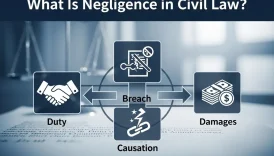What Is a Legal Covenant Not to Sue?

In legal disputes, parties sometimes prefer settlement over prolonged litigation. One way to achieve this is through a covenant not to sue, which protects the defendant from future lawsuits related to the same issue while allowing resolution without admitting liability.
Simple Definition
A covenant not to sue is a legal agreement in which one party promises not to file a lawsuit against another for a specific claim, often in exchange for compensation or settlement terms.
Real-Life Examples of a Covenant Not to Sue
- Personal injury settlements: An injured party accepts compensation and agrees not to sue the responsible driver again.
- Business disputes: Companies settle contract disagreements with a covenant not to sue to prevent future litigation.
- Employment agreements: An employee leaving a company agrees not to sue in exchange for severance benefits.
Importance of the Concept
Covenants not to sue provide certainty and finality in disputes. They help parties avoid costly, time-consuming litigation while ensuring that settlements truly resolve conflicts. Unlike releases, these agreements do not erase the claim but prevent future lawsuits based on it.
Comparison: Covenant Not to Sue vs Release of Claims
Covenant Not to Sue: A promise not to pursue legal action in the future.
Release of Claims: A full relinquishment of legal rights to the claim itself.
| Feature | Covenant Not to Sue | Release of Claims |
|---|---|---|
| Effect | Bars future lawsuits | Extinguishes the claim fully |
| Common Usage | Settlements, contracts | Final resolution of disputes |
| Flexibility | Promise-based, limited scope | Broader, ends claim entirely |
FAQ
1. What does covenant not to sue mean in law?
It is a promise not to pursue legal action against another party for a specific matter.
2. Is a covenant not to sue the same as a release?
No, a release eliminates the claim, while a covenant not to sue prevents future litigation.
3. Why would parties use a covenant not to sue?
To settle disputes efficiently without lengthy court proceedings.
4. Is a covenant not to sue legally enforceable?
Yes, if properly drafted and supported by consideration.
5. Can a covenant not to sue apply to future claims?
It usually applies to specific disputes, but broad agreements must be carefully written to be enforceable.
Closing
A legal covenant not to sue is a powerful settlement tool that prevents further litigation while allowing disputes to be resolved fairly. By distinguishing it from a release, parties can choose the most appropriate method to finalize agreements.






